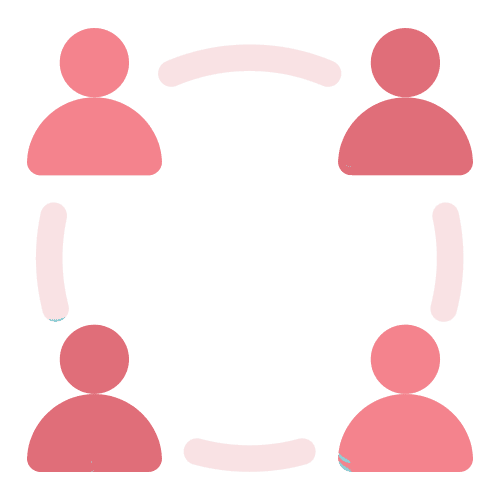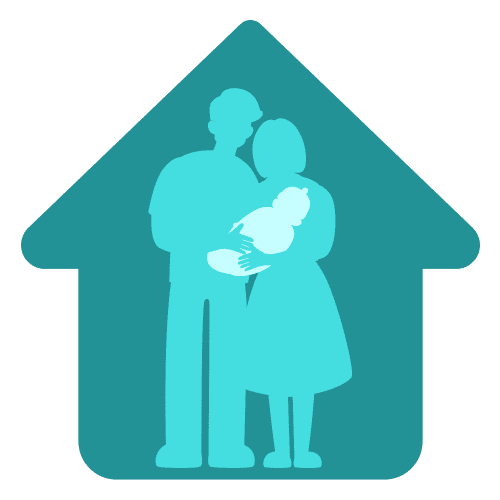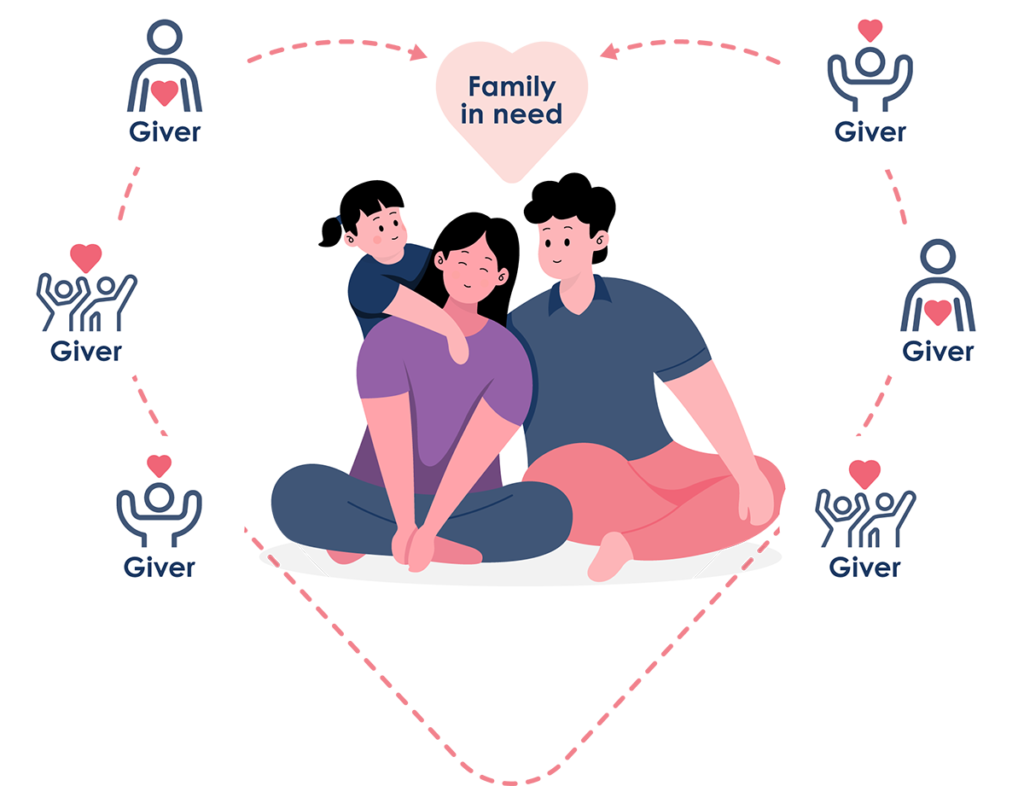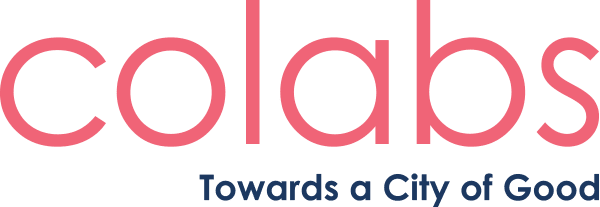Solution Spaces and
Case Studies

How to navigate the Solution Spaces
- Start by exploring each solution space and case study. Some solution spaces are more developed than others. As you read through them, think about how your unique capabilities and strengths could contribute to each one.
- Imagine how you might be able to support each solution space by directing resources or funding their efforts.
- Finally, contribute to an initiative and partner with other like-minded community leaders to amplify the impact.
Solution
Spaces

Standardised financial literacy curriculum for Lower-Income Families
Financial literacy can help Lower-Income Families make informed financial decisions — breaking the cycle of poverty.

Design inclusive job attachments and mentorship programmes with employers
Redesign corporate policies and practices to become more inclusive towards lower-income individuals and their unique circumstances

Abundant Community Initiative
Abundant Community Initiative mobilises individuals or families to give direct financial and social support to those in need without requiring permission or professional assistance.

Create a one-stop service platform for Lower-Income Families
This directory can help Lower-Income Families and social workers navigate the mass of information regarding schemes that support their needs. This platform can help them search for specific schemes or organisations that can directly support their needs.
Case
Studies

Working with Lower-Income Families in rental flats towards home ownership
Increasing opportunities for home ownership can help provide a conducive environment for children to study and thrive, with the presence of positive role models in the neighbourhood.

Educating lower-income parents on the importance of early childhood education and improving parental competencies
Help Lower-Income Families understand the benefits of investing time and effort in their children’s early years, including building a strong foundation for their academic and social development.
Solution Spaces

Standardised financial literacy curriculum for Lower-Income Families
Why is this solution space important?
- Lower-Income Families may not have the bandwidth to consider long-term financial planning due to the pressures of daily needs and a lack of access to information and support networks.
- Financial literacy can help Lower-Income Families break the cycle of poverty by empowering them to make informed financial decisions, such as when budgeting, saving, and investing.
- Standardising financial literacy curriculum can encourage collaboration among financial institutions. These institutions can develop effective training materials, share best practices, and develop a network and resources to help Lower-Income Families to achieve their financial goals.
Key initiative: Creating a comprehensive financial literacy curriculum and network
- Financial institutions can develop a comprehensive curriculum to effectively train Lower-Income Families in financial literacy. The materials should easily be accessible to those who need them most.
- Individuals in the financial industry can volunteer as part of their corporate social responsibility (CSR) initiatives to teach financial literacy, foster stronger connections between banks and the communities they serve, and create a positive impact.
Initiated by
Finance
- Maybank
- DBS
- UOB
- Great Eastern
- Citibank

Make a difference in helping Lower-Income Families access financial literacy education by supporting these amazing initiatives. Your help is greatly appreciated and will contribute to their wonderful initiatives. Make a donation or sign up as a volunteer here.
Write to us to get involve in this solution space.

Design inclusive job attachments and mentorship programmes with employers
- Many larger corporations lack awareness and understanding of the experiences of those from Lower-Income Families.
- There is an opportunity for corporate policies and practices to become more inclusive towards Lower-Income Families and their unique circumstances.
Key initiative: Supporting Lower-Income Families to thrive in the workforce
- Corporates can redesign job opportunities to better suit the needs of individuals from Lower-Income Families. For example, employers can:
- Offer flexible work arrangements, such as the ability to work from home or work flexible hours, to accommodate the caregiving responsibilities of lower-income individuals
- Provide shorter payment periods to help Lower-Income Families meet daily needs.
- Non-profit organisations can share sample profiles of candidates with hiring companies. This will allow corporations to consider redesigning job roles based on the strengths and capabilities of Lower-Income Individuals, beyond traditional roles in supply chain and logistics.
- Non-profit organisations can work closely with CSR Heads to help develop inclusive policies, mentorship programs, and job attachment programs that create a supportive career journey.
Initiated by
Inclusive Jobs
- Lazada
- Daughters Of Tomorrow
- AWWA
- Agape


Abundant Community Initiative
Why is this solution space important?
- Lower-Income Families require a minimum income for financial stability. Without this, they will be in crisis and cannot work on the complex issues that brought them there in the first place.
- Access to financial aid may be burdensome to access or insufficient as public money rightly must meet high standards of fiscal responsibility.
- Professionals are sometimes mobilised to provide services that clients do not want or may not need. Direct giving puts control and autonomy in the hands of Lower-Income Families.
Key initiative: Providing financial and social support
- The Abundant Community Initiative is a partnership between NVPC and Institute of Policy Studies (IPS) that hopes to mobilise a group of individuals to give directly to a family in need without requiring permission or professional assistance.
- Social support can also complement the financial giving, building social capital and encouraging social mixing. This will be a facilitated process where the family articulates their ad hoc needs and longer-term goals, and participants of the initiative can volunteer to help in other ways.
Initiated by
ACI
- Institute of Policy Studies (IPS)
- NVPC

Contribute your time, treasure and talent as part of the Giving Circle. Sign up as an individual or with a group of friends here.

Create a one-stop service platform for Lower-Income Families
- Lower-Income Families often face an overload of information regarding schemes that support their needs. Social workers and lower-income individuals may not have enough time or resources to search through different government and charity websites to find the schemes that apply to them.
- This situation becomes even more complicated when intermediaries are not well-connected with each other.
- Having a platform that consolidates the programmes and support schemes for Lower-Income Families would make searching for and receiving aid easier.
- There are also existing platforms like SupportGoWhere and Schemes SG where individuals can find the relevant support needed.
Initiated by
One Stop Platform
- Various NPOs and Corporates
Case Study

Educating lower-income parents on the importance of early childhood education and improving parental competencies
- Providing a safe and stable living environment for children is crucial in building a strong foundation for their overall social well-being and future success, especially in their earlier years. Given lower-income parents’ need to prioritise work over early childhood education, their children risk being left behind among their peers in the future.
Key initiative: Reading with kids and promoting literacy
- Educating parents about the importance of early childhood development — particularly during the prenatal stage — will help them understand the benefits of investing time and effort in their child’s early years, including building a strong foundation for their academic and social development.
- Through the KidsRead@Home programme, volunteers visit the homes of these families to read with the children and promote interest in reading and literacy.
- The hope is to bridge the gap between Lower-Income Families and their access to regular reading sessions and resources.
Initiated by
Education
- National Library Board
- New Life Stories
- Singapore Children Society
- Other Family Service Centers

Join these wonderful organisations in their efforts to support Lower-Income Families and promote children’s development. You can make a difference by donating or volunteering and contributing to their wonderful cause.

Working with Lower-Income Families in rental flats towards home ownership
- Families aspire to own a home and provide more living space for their growing family. But Lower-Income Families lack funds to do so (e.g. not enough CPF, renovation funds)
- Increasing opportunities for home ownership can help provide a conducive environment for children to study and thrive.
- Space at home and positive neighbourhoods were likely to be contributing factors in helping families and their children move out of poverty.
Key initiative: Boosting opportunities for home ownership among Lower-Income Families
- The Keystart programme is a home-ownership programme by South Central Community Family Service Centre for families living in rental flats with school-going or younger children. The program integrates guidance and financial support to enable families to realise their home-ownership aspirations, and funds income for shortfalls, basic facilities, and unexpected crises.
- The programme offers funding in three areas: the basic habitation fund, access fund, and mortgage support fund.
- The programme facilitates a whole-of-ecosystem support through partnerships with sector-wide stakeholders.
Initiated by
Home Ownership
- SCCFSC

To find out more about the Lower-Income Families Colabs Executive Summary, share input, or discover more ways to help, email us at [email protected].
To download the Lower-Income Families Executive Summary, click here.




















